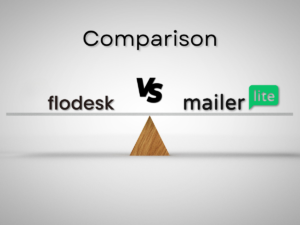Digital marketing’s secret sauce for smashing goals in 2024
Digital marketing is central to the success of modern businesses, now more than ever. In this digital age, where technologies and consumer behavior are constantly evolving, it is critical that businesses adapt their marketing strategies to remain relevant and competitive. This blog post dives deep into the why and how of digital marketing, examines the key components essential for success in 2024 and reveals the latest trends that will shape the future of marketing. Whether you’re just getting started with digital marketing or looking for ways to refine your existing strategies, this guide offers valuable insights and practical tips to take your business to new heights.
Table of contents
The importance of Digital Marketing
Outreach and Accessibility
Imagine your company has a megaphone that allows you to talk to the whole world 24/7. That’s the power of digital marketing. Unlike the old days, where you were limited to who saw your flyer or read your ad in the local paper, digital marketing opens the doors to a global stage. No matter if you work from a small office or your kitchen table, you can reach customers on the other side of the world with the click of a button.
Why is this so revolutionary?
First, because it changes the rules of the game for who can compete in the marketplace. Small startups can now stand shoulder to shoulder with giant companies, all thanks to smart digital marketing strategies. It’s no longer about who has the most money for billboards or TV ads, but who makes the smartest use of SEO, social media, and online content.
How does this work in the real world?
Let’s say you have an online store that sells handmade jewelry. With targeted online ads, you can showcase your beautiful creations to someone who just searched for “unique handmade jewelry.” And voila, you have an interested customer who might never have heard of you had it not been for your digital presence.
Digital marketing is not just a megaphone; it’s a two-way radio. You can communicate directly with your customers, get feedback, and tailor your offerings to what they really want. And because the Internet never sleeps, someone can view and buy your products while you’re snuggled up and dreaming.
Cost-Efficiency

Cost efficiency is a fundamental aspect of any successful marketing strategy, and this is where digital marketing really shines. Compared to traditional marketing methods such as print ads, billboards, and television commercials, digital marketing offers a much more cost-effective way to spread your message. This is because it offers targeted opportunities to appeal to specific audiences without requiring a significant budget.
How Digital Marketing saves costs
Digital marketing is like a smart investment for your business, allowing you to do more with less. Imagine having a way to reach exactly those people who are interested in what you offer, without wasting money on those who are not. That’s the power of digital marketing.
Instead of paying for an ad in hopes that the right person will see it, digital marketing allows you to get your message directly in front of the eyes of your ideal customers. One way this is done is by ensuring that when someone searches online for something you offer, your website is one of the first they see. This is done by making your website “friendly” to search engines, an approach we call SEO, or search engine optimization.
And then there is another clever tactic: instead of paying for an ad that everyone can see, you can choose to pay only if someone is actually interested enough to click on your ad. This is called pay-per-click advertising, and it ensures that your budget is spent on real potential customers.
These methods allow you to use your marketing budget more efficiently. You focus your efforts exactly where they are most effective, on people who have already shown interest in what you have to offer. This makes digital marketing not only cost-effective, but also a smart way to increase your chances of making sales.
ROI: The Real Proof

The effectiveness of cost savings from digital marketing is ultimately measured by ROI (return on investment). Modern analytics and tracking tools make it easy to track and analyze the performance of your campaigns, giving you clear visibility into what’s working. This insight allows you to adjust your strategies and use your budget even more effectively.
Measurability and Data-Driven Decisions
At the heart of digital marketing lies a powerful advantage: the ability to measure every action and base decisions on hard data. This significantly differentiates digital marketing from traditional marketing methods, where campaign effectiveness is often harder to quantify. Thanks to advanced analytics tools, marketers can now see exactly how users are interacting with their content, which campaigns are generating the most traffic, and which strategies are delivering the highest ROI.
Analytics provides an in-depth look at the behavior of your target audience. For example, you can discover through which channels visitors come to your website, how long they stay, and what actions they take. This information is crucial for optimizing your digital marketing strategies and maximizing your budget efficiency.
With access to real-time data, marketers can make decisions faster and with more confidence. If a particular approach does not produce the desired results, you can quickly make adjustments. This adaptive ability means you can always stay one step ahead of market trends and competition.
One of the most effective methods within digital marketing is A/B testing, where two versions of a Web page or ad are tested against each other to determine which performs better. This method provides concrete evidence about which elements of your marketing strategy are most effective, allowing you to focus your efforts on what really works.
Key Components of Digital Marketing in 2024
SEO (Search Engine Optimization)

Search Engine Optimization, or SEO, remains one of the most crucial components of digital marketing in 2024. In a world where the majority of online experiences begin with a search engine, SEO is central to increasing a brand’s online visibility. By optimizing your website and content for search engines, you increase the chances that your target audience will find you when it matters most.
The importance of Keywords
Using the right keywords is at the heart of any effective SEO strategy. By understanding what search terms your target audience uses, you can create content that matches their searches. This not only increases your visibility in search engine result pages (SERPs), but also attracts more relevant traffic to your website.
SEO can be divided into “on-page” and “off-page” elements. On-page SEO includes optimizations you perform on your own Web site, such as improving loading speed, ensuring mobile-friendliness and integrating keywords into your texts and meta tags. Off-page SEO refers to activities outside your own Web site, such as link building and social media strategies, that help increase your site’s authority and trustworthiness.
The role of Content
Content is king in the world of SEO. Quality, relevant content that provides value to your target audience is essential to a strong SEO strategy. This means regularly publishing articles, blogs, and other content that is not only rich in relevant keywords, but also useful and informative to your audience.
Content marketing is at the heart of any successful digital marketing strategy in 2024. This approach revolves around creating and distributing valuable, relevant, and consistent content to attract and retain a specific audience. The ultimate goal? Driving customer actions that are profitable for your business.
Why Content is King
In a world flooded with information, quality content helps your brand stand out. It’s not just about filling your website with random text; it’s about delivering information that your audience actually appreciates and needs. Whether it’s blog posts, videos, podcasts or infographics, good content grabs attention and builds trust with your target audience.
An effective content marketing strategy uses the power of storytelling to create an emotional connection with your audience. People are naturally drawn to stories, and by incorporating your brand story into your content, you can build a deeper relationship with your customers. This not only makes your brand memorable, but also fosters brand loyalty.
SEO and Content Marketing: a Perfect Match
While content marketing is valuable on its own, it becomes even more powerful when combined with SEO. By optimizing your content with the right keywords, you ensure that your content is found by search engines. This increases your brand’s visibility and attracts more organic traffic to your website.
Social Media Marketing

In the digital age of 2024, social media marketing plays an indispensable role in connecting brands with their audiences. Platforms such as Facebook, Instagram, Twitter, and LinkedIn offer unique opportunities for businesses to communicate, engage, and promote their products or services. With billions of users worldwide, the power of social media in digital marketing is unparalleled.
One of the greatest benefits of social media marketing is the ability to increase brand awareness. By having a consistent and authentic presence on social platforms, companies can reach a wide audience and build a brand identity that resonates with their target audience. It’s not just about placing ads, but creating a brand story that captures and holds attention.
Social media is known for its ability to enable direct interaction between brands and consumers. These platforms allow companies to gather feedback, provide customer service, and build a community around their brand. Engagement goes beyond likes and shares; it’s about creating meaningful conversations and relationships with your audience.
The advanced targeting options of social media advertising allow you to target your message to specific demographic groups, locations, interests and more. This ensures efficient use of marketing budgets and increases the likelihood of conversion. Analyzing campaign results provides valuable insights that can be used to refine future marketing efforts.
E-mail Marketing
Despite the emergence of new communication channels, e-mail marketing remains an indispensable pillar within digital marketing in 2024. The power of email lies in its immediacy and personalization, allowing companies to communicate with their target audience in a personal way. This segment explores why email marketing remains relevant and how it can be used effectively.
One of the biggest advantages of e-mail marketing is its ability for in-depth personalization and segmentation. Companies can tailor their messages to specific segments of their target audience based on behavior, preferences, and previous interactions. This not only increases the relevance of each message sent, but also improves the overall user experience and engagement.
Email marketing tools allow companies to create complex automation sequences that activate based on specific user actions. This means you can automatically send welcome emails, birthday wishes, or follow-up messages without constant manual intervention, saving time and increasing efficiency.
Another essential aspect of email marketing is measurability. With comprehensive analytics, marketers can see in detail how recipients are interacting with their emails, from open rates and click rates to conversions. This data is crucial for continuously optimizing campaigns and improving ROI.
Trends in Digital Marketing for 2024

The world of digital marketing is constantly evolving, and keeping up with the latest trends is critical to success. By 2024, some of the most influential trends in digital marketing will change. Below, we explore these trends and how they can affect companies’ strategies.
Artificial Intelligence and Machine Learning
Artificial intelligence (AI) and machine learning continue to redefine the way companies approach their marketing strategies. These technologies enable marketers to gain deeper insights into the behavior and preferences of their target audiences, allowing them to deliver personalized experiences at scale. From chatbots that provide 24/7 customer service to advanced data analytics for better targeting, AI and machine learning are indispensable in every marketer’s toolkit.
Personalization
Personalization is expected to play an even bigger role in digital marketing in 2024. Consumers increasingly expect brands to understand them and provide content that is directly relevant to their interests and needs. This means not just personalized emails or product recommendations, but content tailored to each customer’s unique journey.
Voice Search and Smart Speakers
The rise of voice search and smart speakers such as Amazon Echo and Google Home has opened up new opportunities for digital marketing. Optimizing for voice search requires a different approach than traditional SEO, with a focus on more conversational keywords and phrases. Brands that embrace this trend can increase their visibility in a fast-growing segment of the search market.
Sustainability and Corporate Social Responsibility (CSR).
Consumers are increasingly aware of environmental and social issues, and this influences their purchasing decisions. Brands that communicate their commitment to sustainability and CSR through their digital marketing efforts can build a stronger connection with their audience. This goes beyond just promoting green initiatives; it’s about integrating these values into every aspect of your marketing and business operations.
Video Content
Video content remains a dominant force in digital marketing with a predicted continuation of its growth in popularity. Short video formats, such as those on TikTok and Instagram Reels, offer unique opportunities for brands to communicate with their audiences in creative and engaging ways. By 2024, the use of video in marketing campaigns is expected to increase even further, as video remains one of the most effective ways to convey a message.
Implementing a Digital Marketing Strategy
Developing and implementing an effective digital marketing strategy is crucial to the success of any business in the digital age. A thoughtful strategy not only helps you achieve your marketing goals, but also allows you to use your resources efficiently and achieve better ROI. Here are the steps to establishing a robust digital marketing strategy:
Step 1: Define Objectives
Start by clearly defining what you want to achieve with your digital marketing efforts. Whether it’s to increase brand awareness, generate leads, increase sales, or improve customer loyalty, having clear goals is essential. Make sure your goals are SMART: Specific, Measurable, Acceptable, Realistic, and Time-bound.
Step 2: Know Your Target Audience
A thorough understanding of your target audience is crucial. This includes not only demographic information such as age, gender, and location, but also psychographic data such as interests, needs, and behaviors. The better you understand your target audience, the more effectively you can tailor your digital marketing messages.
Step 3: Choose the Right Channels
Not every digital channel is right for every business or purpose. Based on your goals and target audience, determine which channels will be most effective. This can be a mix of SEO, content marketing, social media marketing, email marketing, and paid advertising.
Step 4: Create Compelling Content
Content is the heart of any digital marketing strategy. Whether it’s blog posts, videos, infographics, or social media posts, make sure your content is relevant, valuable, and engaging to your target audience. Don’t forget to apply SEO principles to increase the discoverability of your content.
Step 5: Implement and Monitor
After launching your digital marketing campaigns, it is important to continuously monitor and analyze performance. Use analytics tools to gain insights into what works and what doesn’t. Be prepared to adjust your strategies based on these insights to improve the effectiveness of your campaigns.
Step 6: Optimize and Repeat
Digital marketing is a continuous process. Based on collected data and feedback, optimize your campaigns and strategies for better results. Experiment with different approaches and keep learning from both successes and failures.
Conclusion
The digital age has created a new playing field on which businesses can thrive through smart, strategic digital marketing. From leveraging SEO to appear at the top of search results, to personalizing content to build deeper connections with customers, the possibilities are endless. Implementing a thoughtful digital marketing strategy is no longer a luxury, but a necessity for any business that wants to stay relevant and grow in today’s competitive marketplace.
The trends of 2024 point to a future where technology, personalization and sustainability are central to attracting and retaining customers. By embracing these trends and taking an agile approach in your marketing efforts, you can not only anticipate the needs of your target audience but also gain a competitive edge.
Remember that success in digital marketing is not a final destination, but an ongoing journey of optimization and adaptation. By making data-driven decisions, constantly evaluating your strategies and adapting to the changing digital landscape, you can reap the rewards of your efforts and achieve sustainable growth for your business.
In a world where digital transformation is in full swing, it is clear that digital marketing is not only important, but indispensable for any business striving for success. Start implementing your digital marketing strategy today and put your company on the map in 2024 and beyond.
For those interested: the following link will take you to wix’s website that introduces 11 successful marketing strategies.
Craving more insights? Explore our blog for the latest tools and trends transforming businesses like yours.




